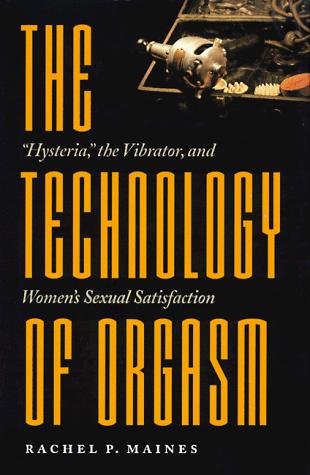Rachel P. Maines: The Technology of Orgasm: “Hysteria”, the Vibrator, and Women’s Sexual Satisfaction (2001)
Filed under book | Tags: · advertising, history of technology, hysteria, sex, technology, vibrator, women

From the time of Hippocrates until the 1920s, massaging female patients to orgasm was a staple of medical practice among Western physicians in the treatment of “hysteria,” an ailment once considered both common and chronic in women. Doctors loathed this time-consuming procedure and for centuries relied on midwives. Later, they substituted the efficiency of mechanical devices, including the electric vibrator, invented in the 1880s. In The Technology of Orgasm, Rachel Maines offers readers a stimulating, surprising, and often humorous account of hysteria and its treatment throughout the ages, focusing on the development, use, and fall into disrepute of the vibrator as a legitimate medical device.
Publisher JHU Press, 2001
Johns Hopkins studies in the history of technology
ISBN 0801866464, 9780801866463
208 pages
PDF (no OCR; updated on 2012-10-23)
Comment (0)Félix Guattari, Suely Rolnik: Molecular Revolution in Brazil (1986–) [BR-PT, ES, EN]
Filed under book | Tags: · abstract machine, body, brazil, cartography, culture, desire, deterritorialization, emotion, energy, history, love, philosophy, politics, psychoanalysis, schizoanalysis, semiotics, sex, subjectivation, subjectivity, unconscious

“Following Brazil’s first democratic election after two decades of military dictatorship, French philosopher Félix Guattari traveled through Brazil in 1982 with Brazilian psychoanalyst Suely Rolnik and discovered an exciting, new political vitality. In the infancy of its new republic, Brazil was moving against traditional hierarchies of control and totalitarian regimes and founding a revolution of ideas and politics. Molecular Revolution in Brazil documents the conversations, discussions, and debates that arose during the trip, including a dialogue between Guattari and Brazil’s future President Luis Ignacia Lula da Silva, then a young gubernatorial candidate. Through these exchanges, Guattari cuts through to the shadowy practices of globalization gone awry and boldly charts a revolution in practice.
Assembled and edited by Rolnik, Molecular Revolution in Brazil is organized thematically; aphoristic at times, it presents a lesser-known, more overtly political aspect of Guattari’s work. Originally published in Brazil in 1986 as Micropolitica: Cartografias do desejo, the book became a crucial reference for political movements in Brazil in the 1980s and 1990s. It now provides English-speaking readers with an invaluable picture of the radical thought and optimism that lies at the root of Lula’s Brazil.”
Originally published as Micropolítica: Cartografias do desejo, Vozes, Petrópolis, 1986.
English edition
Translated by Karel Clapshow and Brian Holmes
Publisher Semiotext(e), Los Angeles 2008
Foreign Agents series
ISBN 1584350512, 9781584350514
495 pages
Review: Aliocha wald Lasowski (Chimères, 2007, FR).
Publisher (EN)
Publisher (ES, Madrid)
Publisher (ES, Buenos Aires)
Micropolítica. Cartografias do desejo (BR-Portuguese, 4th ed., 1984/1996, added on 2017-2-22)
Micropolítica. Cartografías del deseo (Spanish, trans. Florencia Gómez, Madrid ed., 2006, added on 2013-9-26)
Molecular Revolution in Brazil (English, trans. Karel Clapshow and Brian Holmes, 2008, updated on 2017-6-26)
Micropolítica. Cartografías del deseo (Spanish, trans. Florencia Gómez, Buenos Aires ed., 2nd ed., 2006/2013, added on 2020-11-14)
Luciana Parisi: Abstract Sex: Philosophy, Biotechnology and the Mutations of Desire (2004)
Filed under book | Tags: · abstract machine, biotechnology, cybersex, cyborg, desire, deterritorialization, philosophy, sex

“Astract Sex investigates the impact of advances in contemporary science and information technology on conceptions of sex. Evolutionary theory and the technologies of viral information transfer, cloning and genetic engineering are changing the way we think about human sex, reproduction and the communication of genetic information. Abstract Sex presents a philosophical exploration of this new world of sexual, informatic and capitalist multiplicity, of the accelerated mutation of nature and culture.”
Publisher Continuum, 2004
ISBN 0826469906, 9780826469908
227 pages
Interview with author (Matthew Fuller, 2004).
Reviews: Andrew Goffey (Mute 2003), Stella Sandford (Radical Phil 2004), Paul Hegarty (n.d.).
PDF, PDF (updated on 2016-9-3)
Comment (0)
